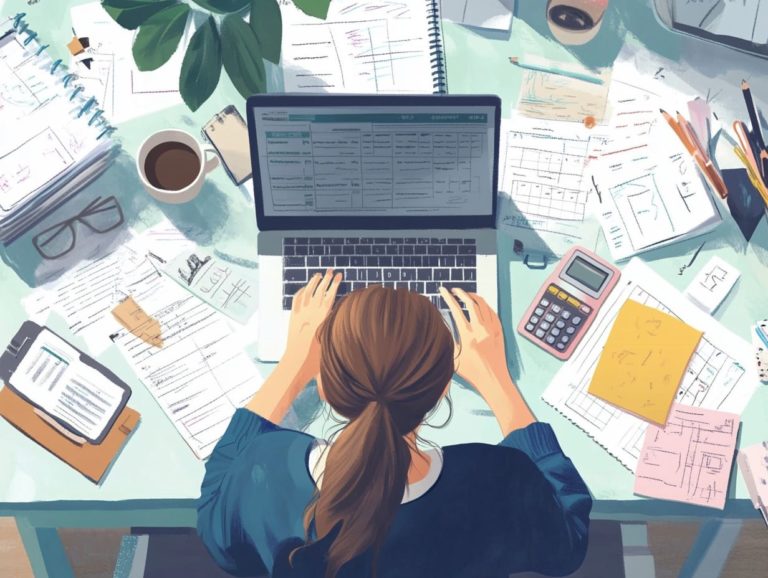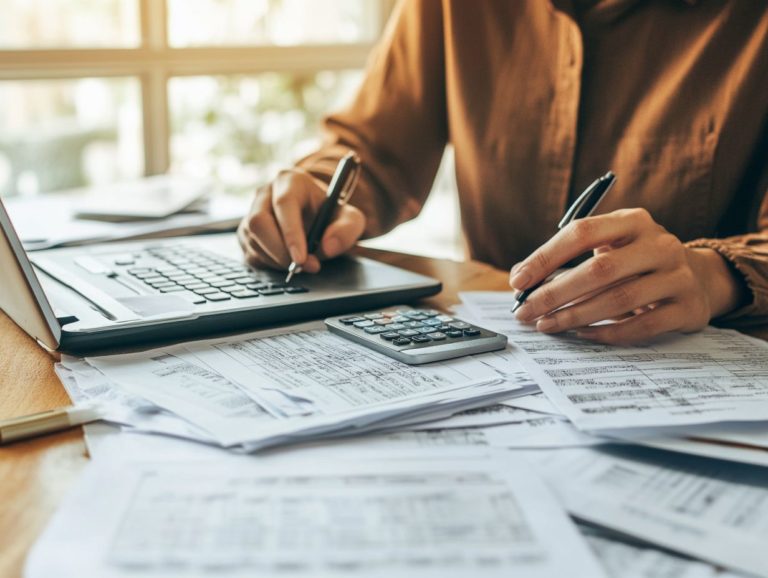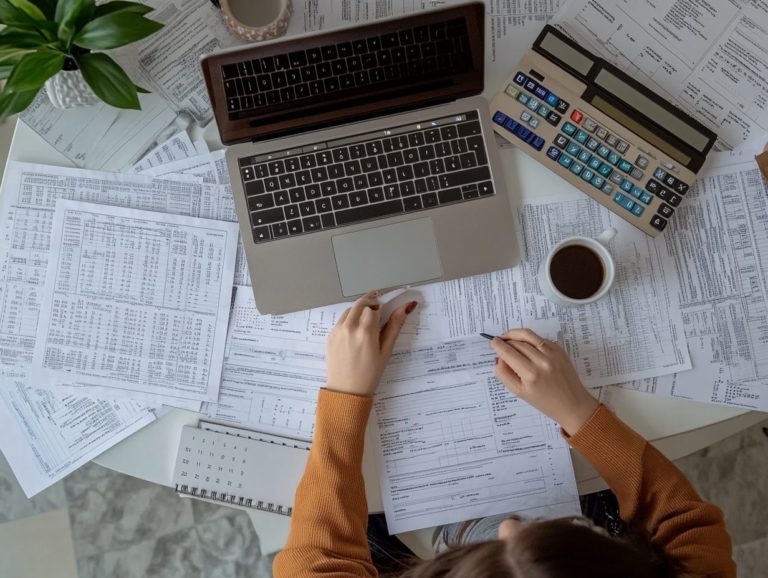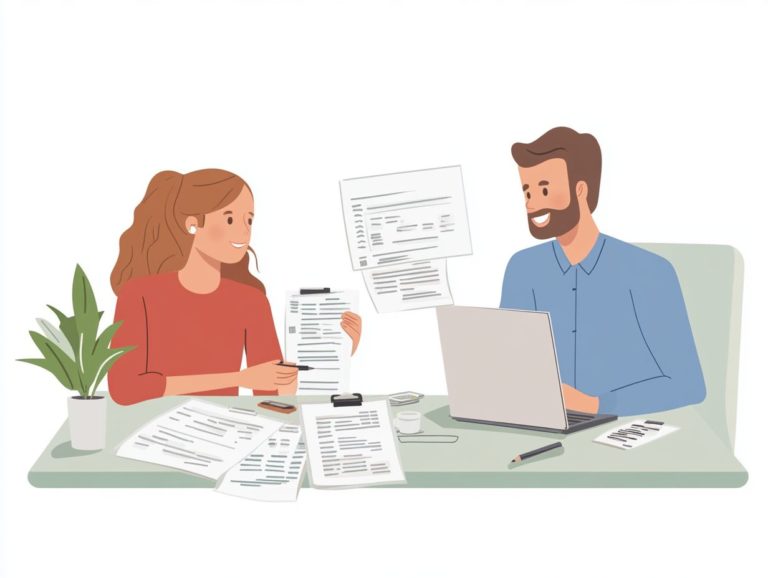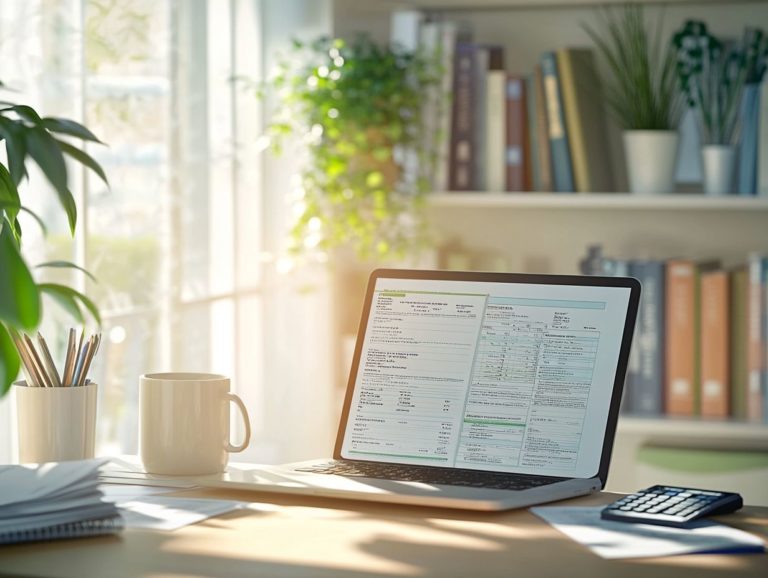What to Know About Tax Refunds for Freelancers
Navigating the intricate world of taxes can be especially daunting for freelancers, who frequently juggle various income streams and a myriad of expenses.
Grasping the concept of tax refunds is essential for maximizing your hard-earned money. This article lays out the fundamentals: what a tax refund entails, who qualifies for one, and how to pinpoint common deductible expenses.
You’ll also discover a detailed guide on filing for your refund, along with strategies to enhance your refund amount. Immerse yourself in this information to optimize your tax situation!
Contents
- Key Takeaways:
- Understanding Tax Refunds for Freelancers
- Eligibility for Tax Refunds as a Freelancer
- Common Expenses that Can Be Deducted
- How to File for a Tax Refund as a Freelancer
- Tips for Maximizing Your Tax Refund
- Frequently Asked Questions
- What to Know About Tax Refunds for Freelancers
- How can I maximize my tax refund as a freelancer?
- What do I need to file for a tax refund as a freelancer?
- Do I need to pay taxes on my freelance income as an individual taxpayer?
- Are there any deductions I should be aware of as a freelancer, including marketing expenses?
- When can I expect to receive my tax refund as a freelancer after filing?
Key Takeaways:
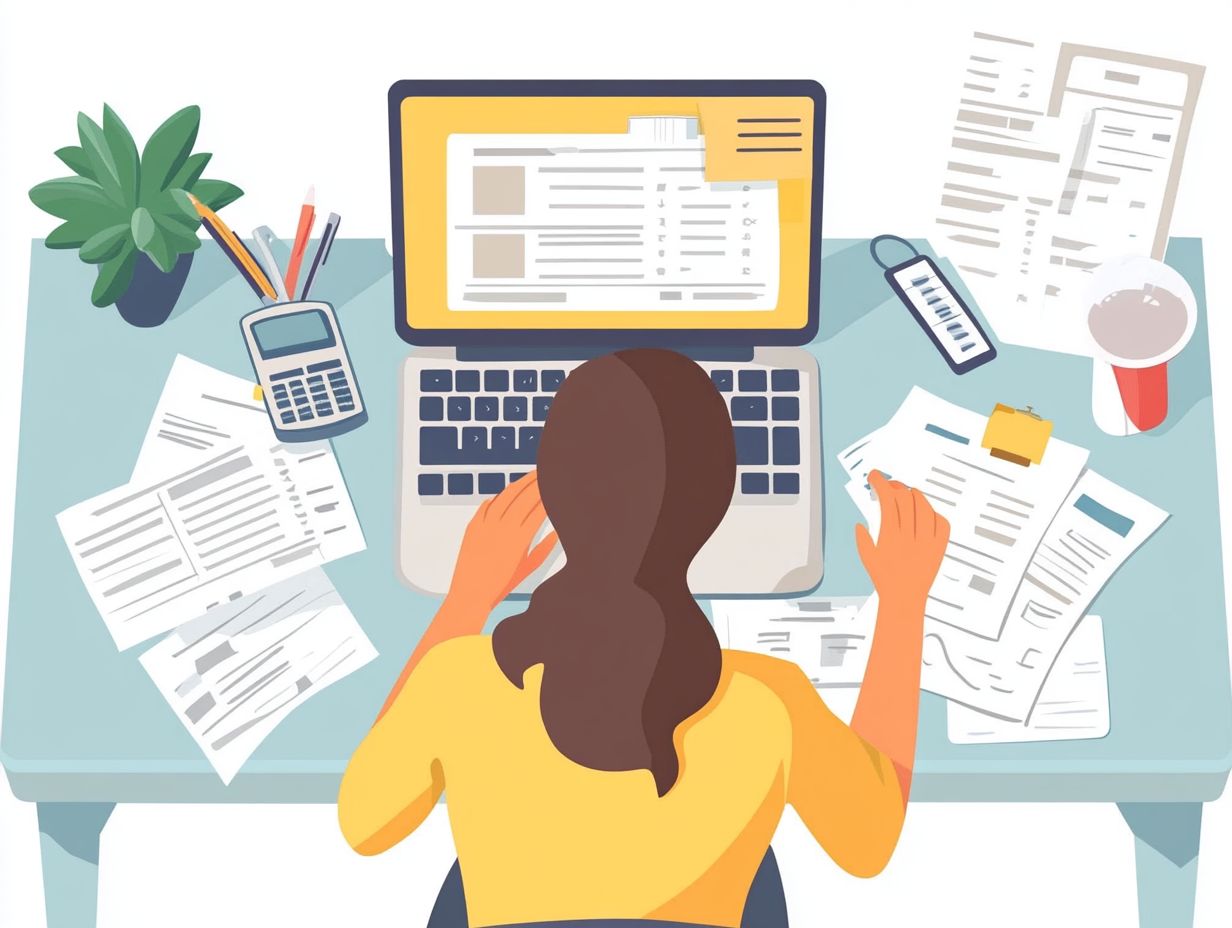
- Freelancers are eligible for tax refunds just like traditional employees but may have different requirements and qualifications.
- It is important for freelancers to keep detailed records of their expenses to maximize deductions and potentially increase their tax refund amount.
- Filing for a tax refund as a freelancer can be done through the same process as traditional employees but may require additional forms or steps depending on the individual’s situation.
Understanding Tax Refunds for Freelancers
Understanding tax refunds as a freelancer means grasping how your distinct financial situation impacts your eligibility for refunds. It’s essential to maintain precise financial records and stay updated on IRS regulations governing freelance income for the 2024 tax season.
As a self-employed individual, you bear the responsibility of estimating payments, filing returns by the deadlines, and identifying which tax deductions you can claim. For new freelancers, following some tax planning tips can help you maximize your potential tax refund while ensuring compliance with your tax obligations.
What is a Tax Refund?
A tax refund is simply the return of excess taxes you’ve paid to the IRS when you file your tax return. This can happen due to various factors, including adjustments in your withholdings, applicable tax deductions, and credits you qualify for during the 2024 tax season.
For freelancers, understanding the details of their tax situation is essential, especially since their income can fluctuate and expenses can vary significantly. Several factors will determine how much you might receive back, such as calculations for self-employment tax (which covers Social Security and Medicare taxes for freelancers), contributions to retirement accounts, and any eligible business expenses you may have. To avoid common pitfalls, check out the top tax mistakes freelancers make and effectively utilize credits like the Earned Income Tax Credit (EITC) to further enhance your potential refund.
As freelancers gear up for the upcoming 2024 tax season, reviewing these elements will clarify your financial situation and help you get the most back!
Eligibility for Tax Refunds as a Freelancer
Your eligibility for tax refunds as a freelancer hinges on several key factors. These include the types of income you earn, your compliance with IRS regulations, and how accurately you report your income, particularly using forms like the 1099-MISC.
This form reflects your freelance income and helps ensure your reporting is accurate for the tax season. Pay attention to these details to maximize your potential for refunds.
Requirements and Qualifications

To qualify for a tax refund, freelancers must navigate specific filing requirements. This includes accurately reporting income using the 1099-MISC form and maintaining records of tax deductions and business expenses.
Understanding current tax laws and deadlines is crucial to avoid penalties. By keeping precise financial records, you not only bolster your claims for deductions but also simplify the tax filing process. This means diligently tracking receipts for materials, travel expenses, and any other costs directly linked to your freelance work. For a deeper understanding, consider exploring the importance of keeping tax records for freelancers.
Doing so allows you to maximize your potential refunds and fully leverage allowable deductions, such as home office expenses and any related freelance tax deductions.
Engaging with accounting professionals or a tax professional can deepen your understanding of various tax credits available, further enhancing your chances of receiving a refund.
Start preparing your documents early to maximize your refund!
Common Expenses that Can Be Deducted
As a freelancer, you have the opportunity to deduct various common expenses from your taxable income. These include essential business costs such as home office expenses, retirement contributions, and contractor services.
By strategically accounting for these deductions, you can effectively reduce your overall tax liability while maximizing your potential tax refunds. For more on this approach, check out how to choose the right tax software as a freelancer. This strategy boosts your finances and gives you more resources to grow your freelance business!
Maximizing Deductions for Freelancers
Maximizing deductions as a freelancer means grasping what qualifies as common and essential costs. Leveraging accounting software to keep a close eye on your business expenses is crucial. This savvy approach ultimately enhances your tax return and boosts your refund potential.
To ensure you capture every eligible expense, it’s crucial to maintain detailed records of costs like home office supplies, travel expenses, and professional development courses. Utilizing software tools such as QuickBooks or FreshBooks can streamline this process, enabling you to easily categorize and track receipts.
Staying informed about the latest tax laws can help you uncover new deduction opportunities, which is always beneficial.
Regularly reviewing your financial records not only helps you spot potential deductions but also prepares you for any future audits, cultivating a proactive stance toward your finances. For freelancers, knowing how to estimate your taxes is crucial in this process.
How to File for a Tax Refund as a Freelancer
Filing for a tax refund as a freelancer demands a clear understanding of the process outlined by the IRS. You’ll need to gather all necessary documents meticulously, accurately report your freelance income, and consider enlisting the expertise of a CPA.
This can help ensure compliance while maximizing your returns, making it easier to navigate freelancer tax rules.
Step-by-Step Guide to Filing

To successfully file for a tax refund, freelancers should embark on a systematic journey that begins with organizing their financial records and completing the required tax return forms. Submit them to the IRS by the specified filing deadline.
Start by gathering all relevant documents think 1099 forms, receipts for business expenses, and bank statements. These pieces create a comprehensive picture of your income and expenditures.
Once you have these records in order, it’s vital to select the correct tax forms, typically the 1040 along with any necessary schedules, to ensure you accurately report your earnings and deductions.
After you ve filled out these forms completely and double-checked for accuracy, take a moment to review your submissions for any potential errors. Submitting these forms electronically or via mail is essential. Don t forget to keep copies for your personal records.
Don t miss those filing deadlines stay on top of them for a smooth refund process!
Tips for Maximizing Your Tax Refund
Maximizing your tax refund as a freelancer requires a thoughtful approach. This means fully leveraging the tax deductions available for your business expenses, making timely estimated tax payments, and contributing to retirement plans.
Each of these strategies can significantly reduce your taxable income for the year, ultimately enhancing your financial outcome, especially when utilized in conjunction with what to know about sales tax as a freelancer.
Strategies for Increasing Your Refund Amount
Strategies for increasing your refund amount as a freelancer include careful record-keeping of business expenses, optimizing available tax deductions, and ensuring compliance with rules set by the Internal Revenue Service (IRS). This helps you steer clear of potential audits and highlights the importance of detailed financial records.
By adopting a systematic approach to record-keeping, you can develop a comprehensive log of all relevant receipts and invoices. This not only maximizes your deductions but also strengthens your claims during tax season. Utilizing tax tips for freelancers in the gig economy along with digital tools or accounting software can make your record-keeping more efficient for intercepting and categorizing your expenses.
Familiarizing yourself with eligible deductions related to home office use, equipment purchases, and travel expenses is crucial, as these can significantly impact your overall tax liability. With thorough preparation and a solid grasp of the tax landscape, boosting your refund amount becomes an achievable goal.

Frequently Asked Questions
What to Know About Tax Refunds for Freelancers

As a freelancer, do I qualify for a tax refund? Understanding the role of 1099 forms is essential. A 1099 form is used to report income that is not from regular employment.
Yes, freelancers are eligible for tax refunds just like traditional employees. However, the process for receiving a tax refund may be slightly different for freelancers.
How can I maximize my tax refund as a freelancer?
One way to maximize your tax refund as a freelancer is to keep track of all business-related expenses. Deductible expenses, such as office supplies and equipment, can help lower your taxable income and increase your refund.
What do I need to file for a tax refund as a freelancer?
To file for a tax refund as a freelancer, you will need documentation of your income and expenses, including 1099 forms from clients and receipts for business expenses. If you use tax preparation software, it will guide you through the necessary steps.
Do I need to pay taxes on my freelance income as an individual taxpayer?
Yes, as a freelancer, you are responsible for paying taxes on your income. Unlike traditional employees, taxes are not automatically withheld from your paychecks. Make sure to set aside a portion of your income for taxes throughout the year.
Are there any deductions I should be aware of as a freelancer, including marketing expenses?
Yes, there are several deductions that freelancers can take advantage of to lower their taxable income and potentially increase their tax refund. These can include home office deductions, travel expenses, and health insurance premiums.
When can I expect to receive my tax refund as a freelancer after filing?
The timeline for receiving a tax refund as a freelancer can vary. It typically takes the IRS 21 days to issue a refund. However, it can take longer if there are any discrepancies or errors on your return. File your taxes early to get your refund sooner!
For personalized advice, consider organizing your documents or consulting a tax professional.

